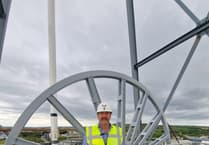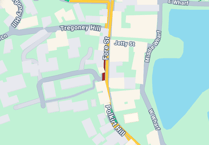A pregnant porpoise found stranded died after being caught up in commercial fishing nets, writes SWNS reporter Holly Mei-Yu Stafford.
The marine mammal was discovered on Pentewan Beach, St Austell by volunteers of the Cornwall Wildlife Trust.
A post-mortem carried out as part of the government-funded Cetacean Strandings Investigation Programme found the animal had been heavily pregnant with a near-term calf.
Showing clear signs of entanglement in a monofilament fishing net - also known as gillnets - it is thought that the porpoise had been trapped through bycatch.
Bycatch is when marine creatures are trapped by commercial fishing nets during fishing for a different species.

James Barnett, veterinary investigator for Cornwall Marine Pathology Team, said: "This is the most distressing case I've ever seen.
"In nearly 20 years of undertaking this work, this is the most distressing case I've ever seen.
"I have rarely seen a female so close to term. It was quite emotional for all of us."
Harbour porpoises are found around the entire UK coastline, particularly in shallow, coastal waters and have been protected under the Wildlife and Countryside Act since 1981.
They are most common in areas like the southern North Sea, the west coast of Scotland, and off the Dorset and South Devon coasts.
Cornwall Wildlife Trust said increased sightings of small cetaceans, which are marine mammals including dolphins and porpoises, over the last nine years had coincided with more interactions with fishing activities.
They have estimated that bycatch kills more than 1,000 harbour porpoises every year in UK waters alone.
However, the trust said fishers had reported difficulties obtaining licences to use the deterrent devices.
Over the last nine years, Cornwall Wildlife Trust say they have seen increased sightings of small marine mammals - including dolphins and porpoises - coinciding with more interactions with fishing activities.
Rebecca Allen, marine conservation officer at the trust, said: "It's an agonising death for the individuals, and this level of loss is not sustainable for these populations.
"Urgent government action is needed to work with fishers, many of whom are ready."
Nick West, chairman of the Mevagissey Fisherman's Association, said: "A trial of the pingers had proven undeniably effective, with no bycatch recorded on cameras installed on vessels using them daily.
"The Association has campaigned endlessly for the devices, which they had offered to fund."





Comments
This article has no comments yet. Be the first to leave a comment.